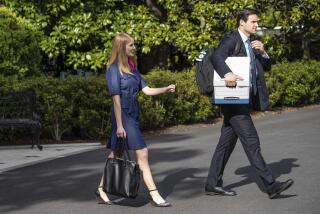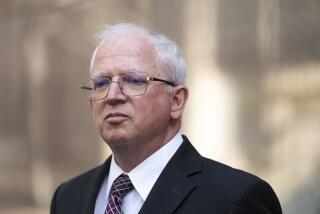Selection of Deaver Jury to Resume : Ex-Reagan Aide Charged With Perjury About Lobbying
- Share via
WASHINGTON — Selection of a jury for the perjury trial of former White House aide Michael K. Deaver will begin anew this morning after a three-month delay.
The former close confidant of President Reagan and his wife, Nancy, faces five charges of lying under oath about his lobbying activities after he left the White House, both to a congressional committee and to a federal grand jury last year.
Although charges of perjury are nothing new to official Washington, Deaver’s defense will be. Under a ruling handed down earlier this month by U.S. District Judge Thomas Penfield Jackson, Deaver’s lawyers will be allowed to present evidence that Deaver’s mind may have been clouded from excessive drinking.
‘Everyone Knows’
“This could be a classic Washington case,” one government official said recently. “Everyone knows that lots of lying and lots of drinking goes on in the nation’s capital. But no one ever realized the two were connected.”
The case also is unusual because there are no so-called “substantive charges.” Deaver is not charged with any direct violation of federal ethics or conflict-of-interest law--only with lying about his actions.
Defense lawyers are expected to seize on this anomaly, telling the jury, in effect: If Deaver did not violate any lobbying rules, why would he lie about what he did? The answer, they will assert, is that he never intended to lie but only gave inaccurate answers to investigators because his memory was impaired by alcoholism.
Deaver’s trial began last July. But Jackson halted selection of potential jurors in the fourth day of trial and ordered a three-month postponement in the case after the U.S. Court of Appeals for the District of Columbia ruled that he was imposing too much secrecy on the selection process.
Supreme Court Ruling
The appellate court said Jackson must open to public view most questioning of prospective jurors, under the terms of a 1984 Supreme Court ruling. However, when Deaver’s attorneys said they wanted to appeal this decision to the Supreme Court, the judge said a three-month delay would enable them to do so.
The high court has not yet decided whether to accept this case. Meanwhile, the trial goes on.
Whitney North Seymour Jr., the court-appointed prosecutor in the case, has refused to say publicly why the indictment he obtained last March contained only perjury rather than conflict-of-interest charges.
But several legal authorities said Seymour apparently believed that Deaver may have violated the spirit but not the letter of federal ethics laws, so conflict of interest would be difficult to prove.
Legally Separate
These authorities said that Deaver’s attorneys apparently convinced Seymour that some of the government officials Deaver had contacted in connection with his public relations business were outside the circle of those whom the law forbade him to lobby. That is, they were in agencies such as the Office of Management and Budget and the National Security Council, White House agencies that legally are separate from the Executive Office of the President, where Deaver had worked.
Under the 1978 Ethics in Government Act, former high officials like Deaver are prohibited from contacting their former agencies on behalf of a business client for 12 months after they leave government service. Such contacts are proscribed for even longer periods when the ex-official had direct supervision over the subject under consideration.
Deaver resigned as deputy White House chief of staff in May, 1985--after serving for 4 1/2 years--and immediately began lining up business firms and foreign governments he proposed to represent in Washington for fees of hundreds of thousands of dollars per year.
‘Falsely Portrayed Himself’
Seymour has said in court papers that Deaver lied to avoid public embarrassment and to conceal the true nature of his business.
“Deaver falsely portrayed himself (in his literature) as a grand ‘strategic planner’ who was hired not for his connections with the First Family and the highest levels of the executive branch, but for his ability to engage in big-picture ‘strategizing,’ ” Seymour wrote.
“Admitting that he was merely peddling ‘access’ would have resulted--in addition to the legal and pecuniary consequences . . . in embarrassment to himself and his friends.”
Deaver, if convicted on all five counts, could face maximum punishment of 25 years in prison and $34,000 in fines.
Seymour’s case suffered a setback last summer when the judge refused to support his efforts to call Canadian Ambassador Allan Gotlieb as a prosecution witness. Seymour, despite objections from the State Department and the Canadian government, wanted Gotlieb to testify about his dealings with Deaver to prove that Deaver had lied to federal investigators.
Contract Not Renewed
Deaver had a $105,000 contract to represent the Canadian government during his first year in private business but the contract was not renewed.
Seymour last week tried again to secure Gotlieb as a witness by sending a strongly worded note to the Canadian Embassy. But the tactic backfired when the Justice Department sharply criticized Seymour for attempting to breach diplomatic immunity.
The former presidential aide has contended that his once-lucrative business, with $4.5 million in consulting contracts, has dwindled to virtually nothing because of Seymour’s yearlong investigation.
Jury selection is expected to occupy most of this week. The testimony of witnesses for the prosecution and the defense will take another four weeks, attorneys have estimated.
More to Read
Sign up for Essential California
The most important California stories and recommendations in your inbox every morning.
You may occasionally receive promotional content from the Los Angeles Times.










